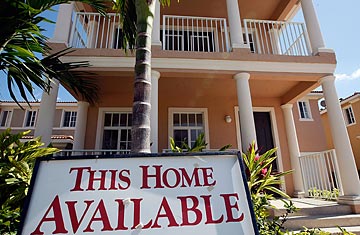
A house for sale in Miami
(2 of 2)
Their goal is to help homeowners like Ruby Milligan, a single, 61-year-old retired middle school teacher who suffered a mild stroke a few years ago. During the housing boom, when her three-bedroom Miami Gardens house was appraised at what she now acknowledges was an unrealistic $294,000, Milligan says she took out adjustable-rate home-equity loans to help with medical bills. They raised her mortgage principal to far more than the house is now worth in the housing bust. Her mortgage interest has since adjusted up sharply, and she's saddled with monthly payments that eat up more than 50% of her income, and which she has already fallen behind on.
Milligan's lender has already started foreclosure without offering a loan modification, primarily because it feels Milligan's retiree income is insufficient. Milligan says it would be sufficient if she could get a loan revision, which she believes the bank has an obligation to consider. "I never really understood the kind of adjustable-rate loan I was given, which I feel was a bit predatory, given my economic circumstances," she says. "I'm even willing to buy the house outright from them for what I'm told they'd probably get it for at auction, around $100,000. Anything to keep the house. My neighborhood's got too many foreclosed homes as it is." She points to one that lenders have yet to sell — but which she and her neighbors fear has become a nighttime lair for drug-addict squatters.
Milligan knows that the bank's first impulse, from a business standpoint, is to try to auction the house and at least get some long-term mortgage-interest revenue out of the sale. That's a big reason so many banks have balked at loan modifications in spite of MHA: they'd rather roll the dice with another owner since studies show many modified mortgages still go south, just delaying the inevitable. But in cases like Miami Gardens, says Milligan's lawyer, Miami real estate attorney Rashmi Airan-Pace, lenders need to realize that as foreclosures mount and infect neighborhoods, their chances of auctioning those houses dim significantly. "Given what fair market value of these homes has become today," Airan-Pace says, "they especially need to change their mind-set about reducing principal," which she complains too few are willing to consider so far.
Still, advocates like Airan-Pace say the banks, perhaps because of Geithner's grousing or because they've gotten up to speed on MHA's procedures, have stepped up their modification activity in recent weeks. That's giving them hope that MHA perhaps has a future after all. "This month we've actually been raking them in," says Airan-Pace, who's now confident that she'll be able to work something out for Milligan.
But Williams, who is running for U.S. Congress next year, says the banks still need a push. In an editorial last week, the Miami Herald also broached the subject, saying that if lenders "do not step up their efforts to help stressed-out homeowners," then Congress should consider a "change in federal law that would allow bankruptcy judges to reduce the principal owned on home mortgages." In other words, if Williams can't get his law passed in his hometown, perhaps he'll have better luck later if he wins a seat on Capitol Hill.
